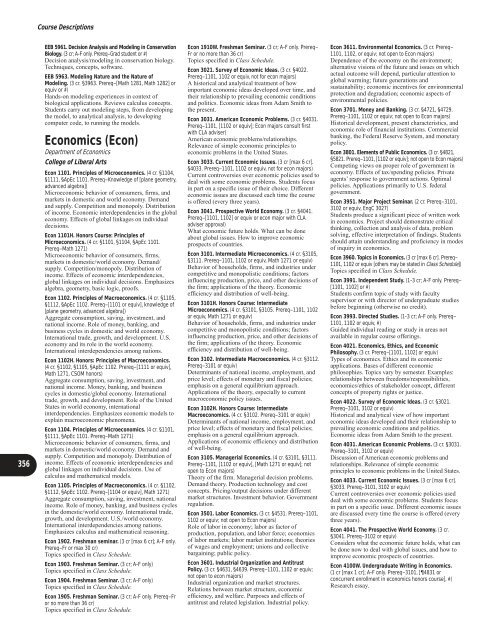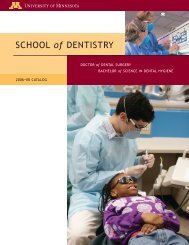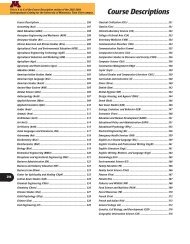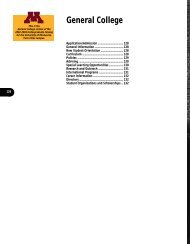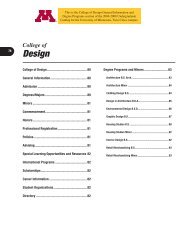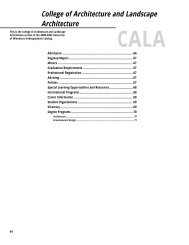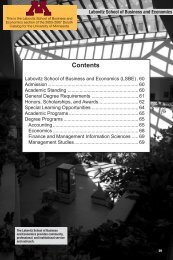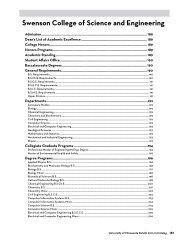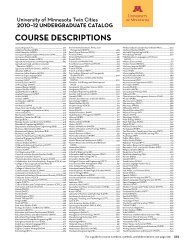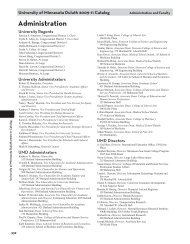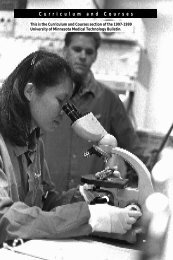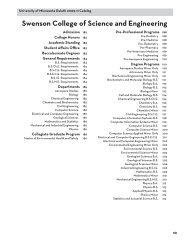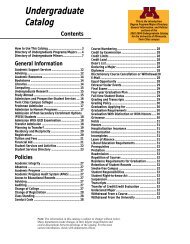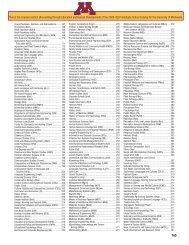CoursesâCSCI through FSCN - University Catalogs - University of ...
CoursesâCSCI through FSCN - University Catalogs - University of ...
CoursesâCSCI through FSCN - University Catalogs - University of ...
Create successful ePaper yourself
Turn your PDF publications into a flip-book with our unique Google optimized e-Paper software.
Course Descriptions356EEB 5961. Decision Analysis and Modeling in ConservationBiology. (3 cr; A-F only. Prereq–Grad student or #)Decision analysis/modeling in conservation biology.Techniques, concepts, s<strong>of</strong>tware.EEB 5963. Modeling Nature and the Nature <strong>of</strong>Modeling. (3 cr. §3963. Prereq–[Math 1281, Math 1282] orequiv or #)Hands-on modeling experiences in context <strong>of</strong>biological applications. Reviews calculus concepts.Students carry out modeling steps, from developingthe model, to analytical analysis, to developingcomputer code, to running the models.Economics (Econ)Department <strong>of</strong> EconomicsCollege <strong>of</strong> Liberal ArtsEcon 1101. Principles <strong>of</strong> Microeconomics. (4 cr. §1104,§1111, §ApEc 1101. Prereq–Knowledge <strong>of</strong> [plane geometry,advanced algebra])Microeconomic behavior <strong>of</strong> consumers, firms, andmarkets in domestic and world economy. Demandand supply. Competition and monopoly. Distribution<strong>of</strong> income. Economic interdependencies in the globaleconomy. Effects <strong>of</strong> global linkages on individualdecisions.Econ 1101H. Honors Course: Principles <strong>of</strong>Microeconomics. (4 cr. §1101, §1104, §ApEc 1101.Prereq–Math 1271)Microeconomic behavior <strong>of</strong> consumers, firms,markets in domestic/world economy. Demand/supply. Competition/monopoly. Distribution <strong>of</strong>income. Effects <strong>of</strong> economic interdependencies,global linkages on individual decisions. Emphasizesalgebra, geometry, basic logic, pro<strong>of</strong>s.Econ 1102. Principles <strong>of</strong> Macroeconomics. (4 cr. §1105,§1112, §ApEc 1102. Prereq–[1101 or equiv], knowledge <strong>of</strong>[plane geometry, advanced algebra])Aggregate consumption, saving, investment, andnational income. Role <strong>of</strong> money, banking, andbusiness cycles in domestic and world economy.International trade, growth, and development. U.S.economy and its role in the world economy.International interdependencies among nations.Econ 1102H. Honors: Principles <strong>of</strong> Macroeconomics.(4 cr. §1102, §1105, §ApEc 1102. Prereq–[1111 or equiv],Math 1271, CSOM honors)Aggregate consumption, saving, investment, andnational income. Money, banking, and businesscycles in domestic/global economy. Internationaltrade, growth, and development. Role <strong>of</strong> the UnitedStates in world economy, internationalinterdependencies. Emphasizes economic models toexplain macroeconomic phenomena.Econ 1104. Principles <strong>of</strong> Microeconomics. (4 cr. §1101,§1111, §ApEc 1101. Prereq–Math 1271)Microeconomic behavior <strong>of</strong> consumers, firms, andmarkets in domestic/world economy. Demand andsupply. Competition and monopoly. Distribution <strong>of</strong>income. Effects <strong>of</strong> economic interdependencies andglobal linkages on individual decisions. Use <strong>of</strong>calculus and mathematical models.Econ 1105. Principles <strong>of</strong> Macroeconomics. (4 cr. §1102,§1112, §ApEc 1102. Prereq–[1104 or equiv], Math 1271)Aggregate consumption, saving, investment, nationalincome. Role <strong>of</strong> money, banking, and business cyclesin the domestic/world economy. International trade,growth, and development. U.S./world economy.International interdependencies among nations.Emphasizes calculus and mathematical reasoning.Econ 1902. Freshman seminar. (3 cr [max 6 cr]; A-F only.Prereq–Fr or max 30 cr)Topics specified in Class Schedule.Econ 1903. Freshman Seminar. (3 cr; A-F only)Topics specified in Class Schedule.Econ 1904. Freshman Seminar. (3 cr; A-F only)Topics specified in Class Schedule.Econ 1905. Freshman Seminar. (3 cr; A-F only. Prereq–Fror no more than 36 cr)Topics specified in Class Schedule.Econ 1910W. Freshman Seminar. (3 cr; A-F only. Prereq–Fr or no more than 36 cr)Topics specified in Class Schedule.Econ 3021. Survey <strong>of</strong> Economic Ideas. (3 cr. §4022.Prereq–1101, 1102 or equiv, not for econ majors)A historical and analytical treatment <strong>of</strong> howimportant economic ideas developed over time, andtheir relationship to prevailing economic conditionsand politics. Economic ideas from Adam Smith tothe present.Econ 3031. American Economic Problems. (3 cr. §4031.Prereq–1101, [1102 or equiv]; Econ majors consult firstwith CLA adviser)American economic problems/relationships.Relevance <strong>of</strong> simple economic principles toeconomic problems in the United States.Econ 3033. Current Economic Issues. (3 cr [max 6 cr].§4033. Prereq–1101, 1102 or equiv, not for econ majors)Current controversies over economic policies used todeal with some economic problems. Students focusin part on a specific issue <strong>of</strong> their choice. Differenteconomic issues are discussed each time the courseis <strong>of</strong>fered (every three years).Econ 3041. Prospective World Economy. (3 cr. §4041.Prereq–[1101, 1102] or equiv or econ major with CLAadviser approval)What economic future holds. What can be doneabout global issues. How to improve economicprospects <strong>of</strong> countries.Econ 3101. Intermediate Microeconomics. (4 cr. §3105,§3111. Prereq–1101, 1102 or equiv, Math 1271 or equiv)Behavior <strong>of</strong> households, firms, and industries undercompetitive and monopolistic conditions; factorsinfluencing production, price, and other decisions <strong>of</strong>the firm; applications <strong>of</strong> the theory. Economicefficiency and distribution <strong>of</strong> well-being.Econ 3101H. Honors Course: IntermediateMicroeconomics. (4 cr. §3101, §3105. Prereq–1101, 1102or equiv, Math 1271 or equiv)Behavior <strong>of</strong> households, firms, and industries undercompetitive and monopolistic conditions; factorsinfluencing production, price, and other decisions <strong>of</strong>the firm; applications <strong>of</strong> the theory. Economicefficiency and distribution <strong>of</strong> well-being.Econ 3102. Intermediate Macroeconomics. (4 cr. §3112.Prereq–3101 or equiv)Determinants <strong>of</strong> national income, employment, andprice level; effects <strong>of</strong> monetary and fiscal policies;emphasis on a general equilibrium approach.Applications <strong>of</strong> the theory, especially to currentmacroeconomic policy issues.Econ 3102H. Honors Course: IntermediateMacroeconomics. (4 cr. §3102. Prereq–3101 or equiv)Determinants <strong>of</strong> national income, employment, andprice level; effects <strong>of</strong> monetary and fiscal policies;emphasis on a general equilibrium approach.Applications <strong>of</strong> economic efficiency and distribution<strong>of</strong> well-being.Econ 3105. Managerial Economics. (4 cr. §3101, §3111.Prereq–1101, [1102 or equiv], [Math 1271 or equiv]; notopen to Econ majors)Theory <strong>of</strong> the firm. Managerial decision problems.Demand theory. Production technology and costconcepts. Pricing/output decisions under differentmarket structures. Investment behavior. Governmentregulation.Econ 3501. Labor Economics. (3 cr. §4531. Prereq–1101,1102 or equiv; not open to Econ majors)Role <strong>of</strong> labor in economy; labor as factor <strong>of</strong>production, population, and labor force; economics<strong>of</strong> labor markets; labor market institutions; theories<strong>of</strong> wages and employment; unions and collectivebargaining; public policy.Econ 3601. Industrial Organization and AntitrustPolicy. (3 cr. §4631, §4639. Prereq–1101, 1102 or equiv;not open to econ majors)Industrial organization and market structures.Relations between market structure, economicefficiency, and welfare. Purposes and effects <strong>of</strong>antitrust and related legislation. Industrial policy.Econ 3611. Environmental Economics. (3 cr. Prereq–1101, 1102, or equiv; not open to Econ majors)Dependence <strong>of</strong> the economy on the environment;alternative visions <strong>of</strong> the future and issues on whichactual outcome will depend, particular attention toglobal warming; future generations andsustainability; economic incentives for environmentalprotection and degradation; economic aspects <strong>of</strong>environmental policies.Econ 3701. Money and Banking. (3 cr. §4721, §4729.Prereq–1101, 1102 or equiv; not open to Econ majors)Historical development, present characteristics, andeconomic role <strong>of</strong> financial institutions. Commercialbanking, the Federal Reserve System, and monetarypolicy.Econ 3801. Elements <strong>of</strong> Public Economics. (3 cr. §4821,§5821. Prereq–1101, [1102 or equiv]; not open to Econ majors)Competing views on proper role <strong>of</strong> government ineconomy. Effects <strong>of</strong> tax/spending policies. Privateagents’ response to government actions. Optimalpolicies. Applications primarily to U.S. federalgovernment.Econ 3951. Major Project Seminar. (2 cr. Prereq–3101,3102 or equiv, EngC 3027)Students produce a significant piece <strong>of</strong> written workin economics. Project should demonstrate criticalthinking, collection and analysis <strong>of</strong> data, problemsolving, effective interpretation <strong>of</strong> findings. Studentsshould attain understanding and pr<strong>of</strong>iciency in modes<strong>of</strong> inquiry in economics.Econ 3960. Topics in Economics. (3 cr [max 6 cr]. Prereq–1101, 1102 or equiv [others may be stated in Class Schedule])Topics specified in Class Schedule.Econ 3991. Independent Study. (1-3 cr; A-F only. Prereq–[1101, 1102] or #)Students confirm topic <strong>of</strong> study with facultysupervisor or with director <strong>of</strong> undergraduate studiesbefore beginning (otherwise no credit).Econ 3993. Directed Studies. (1-3 cr; A-F only. Prereq–1101, 1102 or equiv, #)Guided individual reading or study in areas notavailable in regular course <strong>of</strong>ferings.Econ 4021. Economics, Ethics, and EconomicPhilosophy. (3 cr. Prereq–[1101, 1102] or equiv)Types <strong>of</strong> economics. Ethics and its economicapplications. Bases <strong>of</strong> different economicphilosophies. Topics vary by semester. Examples:relationships between freedoms/responsibilities,economics/ethics <strong>of</strong> stakeholder concept, differentconcepts <strong>of</strong> property rights or justice.Econ 4022. Survey <strong>of</strong> Economic Ideas. (3 cr. §3021.Prereq–3101, 3102 or equiv)Historical and analytical view <strong>of</strong> how importanteconomic ideas developed and their relationship toprevailing economic conditions and politics.Economic ideas from Adam Smith to the present.Econ 4031. American Economic Problems. (3 cr. §3031.Prereq–3101, 3102 or equiv)Discussion <strong>of</strong> American economic problems andrelationships. Relevance <strong>of</strong> simple economicprinciples to economic problems in the United States.Econ 4033. Current Economic Issues. (3 cr [max 6 cr].§3033. Prereq–3101, 3102 or equiv)Current controversies over economic policies useddeal with some economic problems. Students focusin part on a specific issue. Different economic issuesare discussed every time the course is <strong>of</strong>fered (everythree years).Econ 4041. The Prospective World Economy. (3 cr.§3041. Prereq–3102 or equiv)Considers what the economic future holds, what canbe done now to deal with global issues, and how toimprove economic prospects <strong>of</strong> countries.Econ 4100W. Undergraduate Writing in Economics.(1 cr [max 1 cr]; A-F only. Prereq–3101, [4831 orconcurrent enrollment in economics honors course], #)Research essay.


